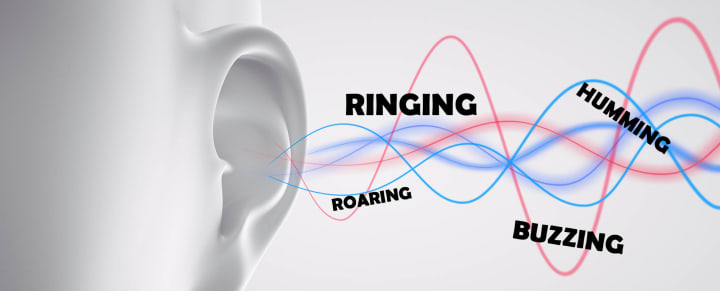Tinnitus and insomnia: How to sleep better with tinnitus
Click here to learn more

Tinnitus is a common condition that affects millions of people worldwide. It is characterized by the perception of ringing, buzzing, hissing, or other sounds in the ears or head that are not caused by external sources. Tinnitus can be caused by a variety of factors, including exposure to loud noise, age-related hearing loss, and certain medical conditions.
One of the most challenging aspects of living with tinnitus is the impact it can have on sleep. Tinnitus can make it difficult to fall asleep, stay asleep, or achieve restful sleep. In this article, we will explore the relationship between tinnitus and insomnia and provide tips and strategies for sleeping better with tinnitus.
Understanding the Relationship Between Tinnitus and Insomnia
Insomnia is a common sleep disorder that affects millions of people worldwide. It is characterized by difficulty falling asleep, staying asleep, or achieving restful sleep. Insomnia can be caused by a variety of factors, including stress, anxiety, depression, certain medical conditions, and medication side effects.
Tinnitus and insomnia often go hand in hand. The perceived internal sounds of tinnitus can make it difficult to fall asleep or stay asleep, leading to sleep disturbances and insomnia. Conversely, the lack of restful sleep can exacerbate tinnitus symptoms, creating a vicious cycle that can be difficult to break.
In addition to difficulty falling asleep and staying asleep, tinnitus can also affect the quality of sleep. People with tinnitus often report that their sleep is less restful, and they wake up feeling tired and groggy. This can have a negative impact on overall quality of life, as well as mood, productivity, and cognitive function.

Tips for Sleeping Better with Tinnitus
While there is no cure for tinnitus, there are strategies that can help manage tinnitus symptoms and improve sleep quality. Here are some tips for sleeping better with tinnitus:
1. Create a Sleep-Friendly Environment
Creating a sleep-friendly environment is essential for achieving restful sleep with tinnitus. This includes:
Keeping the bedroom dark, quiet, and cool
Using comfortable bedding and pillows
Avoiding stimulating activities in the bedroom, such as watching TV or using electronic devices
Using white noise or other soothing sounds to mask the sound of tinnitus
2. Practice Good Sleep Hygiene
Good sleep hygiene is essential for improving sleep quality and managing tinnitus symptoms. This includes:
Establishing a regular sleep schedule and sticking to it, even on weekends
Avoiding caffeine, alcohol, and nicotine, especially before bedtime
Engaging in relaxation techniques before bedtime, such as deep breathing, meditation, or yoga
Exercising regularly, but avoiding intense exercise close to bedtime
3. Use Sound Therapy
Sound therapy is a common strategy for managing tinnitus and improving sleep quality. This can include:
Using white noise machines or sound generators to mask the sound of tinnitus
Listening to music or nature sounds to promote relaxation and reduce stress
Trying cognitive behavioral therapy (CBT) or mindfulness-based stress reduction (MBSR) techniques to change the way you perceive tinnitus
4. Consider Tinnitus-Specific Treatments
There are a variety of treatments that are specifically designed to manage tinnitus symptoms. These include:
Tinnitus retraining therapy (TRT), which uses a combination of sound therapy and counseling to help retrain the brain to ignore the sound of tinnitus
Cognitive behavioral therapy (CBT), which focuses on changing negative thought patterns and behaviors related to tinnitus
Neuromodulation therapy, which uses electrical or magnetic stimulation to alter the activity of the brain and reduce tinnitus symptoms
5. Consult with a Healthcare Professional
If you are struggling with tinnitus-related insomnia, it is important to consult with a healthcare professional to develop a comprehensive treatment plan. A healthcare professional can help identify the underlying causes of tinnitus and insomnia, recommend appropriate treatments, and monitor your progress.
Additional Tips for Managing Tinnitus and Insomnia
In addition to the strategies outlined above, there are several additional tips that can help manage tinnitus and improve sleep quality:
1. Stay Positive
Living with tinnitus can be challenging, but it is important to stay positive and focus on the things you can control. Remember that there are effective treatments for tinnitus and insomnia, and that many people are able to manage their symptoms and improve their quality of life.
2. Manage Stress
Stress and anxiety can exacerbate tinnitus and make it more difficult to sleep. Engaging in stress-reducing activities, such as exercise, meditation, or deep breathing, can help reduce stress and improve sleep quality.
3. Get Support
Living with tinnitus can be isolating, but it is important to seek out support from friends, family, or support groups. Talking to others who understand what you are going through can provide emotional support and practical tips for managing tinnitus.
4. Consider Alternative Therapies
In addition to traditional treatments for tinnitus and insomnia, there are several alternative therapies that may be helpful. These include acupuncture, massage therapy, and herbal supplements. However, it is important to consult with a healthcare professional before trying any new treatments.
Conclusion
Tinnitus and insomnia can be challenging conditions to manage, but there are effective strategies that can help improve sleep quality and manage tinnitus symptoms. Creating a sleep-friendly environment, practicing good sleep hygiene, using sound therapy, considering tinnitus-specific treatments, consulting with a healthcare professional, staying positive, managing stress, and getting support are all important strategies for managing tinnitus-related insomnia. By implementing these tips and strategies, people with tinnitus can achieve restful sleep and improve their overall quality of life.
Say goodbye to tinnitus and hello to peace of mind! Try our 100% natural blend support today and start experiencing the relief you deserve. Don't let tinnitus control your life any longer - take action now and discover the power of nature."
Click Here to Try our 100% natural blend support today

Affiliate Disclosure:
There are links on this site that can be defined as affiliate links. This means that I may or may not receive a small commission. If you purchase something through links provided on this website.
About the Creator
Your GUIDE
Say goodbye to tinnitus and hello to peace of mind! Try our 100% natural blend support today and start experiencing the relief you deserve. Don't let tinnitus control your life any longer - take action now and discover the power of nature
Enjoyed the story? Support the Creator.
Subscribe for free to receive all their stories in your feed. You could also pledge your support or give them a one-off tip, letting them know you appreciate their work.






Comments
There are no comments for this story
Be the first to respond and start the conversation.